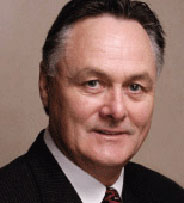AMS Keeling
Talks Up Little Guy
 On
Wednesday, November 3, Julian Keeling cast a spotlight upon the small
to mid-sized forwarder at the TIACA Air Cargo Forum, currently going on
in Amsterdam, saying: On
Wednesday, November 3, Julian Keeling cast a spotlight upon the small
to mid-sized forwarder at the TIACA Air Cargo Forum, currently going on
in Amsterdam, saying:
“The Holy Grail of the forwarder in
any mode of transport remains enduring, delivering freight in a safe,
reliable and hassle-free manner, with complete integrity and fulfillment
to the shipper.”
"The key, I think, is that small and
medium forwarders should concentrate fully on the individual customer,
rather than the big multi-nationals "whose customers become numbers
and not names."
The outspoken and often contriversial CEO
of Los Angeles based Consolidators International, Inc added:
"Personal service is not a cliché,
but the difference either in retaining or losing a customer.
"Responding to the customer's needs
with integrity and care must be the driving force in any forwarder-client
relationship. Technological bells and whistles alone are not sufficient
to satisfy the client," observed the wholesaler/forwarder.
Keeling warned, however, that "success
is not automatic. The smaller forwarder must evolve as the air cargo market
inevitably changes, driven by dynamic economic forces."
To Keeling, evolving does not mean the forwarder
should offer a wide array of ancillary services, such as inventory control
or warehousing "which generally are loss leaders," but become
an expert in every phase of transportation. "The air freight forwarder
should look beyond moving goods strictly via air. Shippers are shifting
their focus, demanding their agents be fully knowledgeable in transporting
their products by air, sea, truck or rail or any combination thereof.
The smaller forwarder must respond to these often shifting demands or
the consolidator has one less customer," averred the Los Angeles-based
executive.
Keeling said the smaller forwarder must
solicit business with a rifle, not a shotgun. "Pick your targets
carefully," he asserted. The transport executive suggested targeting
a number of markets, which the "big boys" have either overlooked
or consider too small to bother with.
"There is any number of 'hidden' markets
which the smaller forwarder can pursue successfully," said Keeling.
"These include cargo bound for smaller destinations where a constant
supply of consumer and business products is required, but in lesser quantities,"
stated Keeling.
He pointed to CII's success in cultivating
the American Samoan market where his company now generates 80 percent
of the air forwarding business to that South Pacific Island in addition
to heavy container sea traffic. "American Samoa is a small island
with only 65,000 population. No one really cultivated it until CII saw
an opportunity there."
Keeling also pointed to "niche"
markets like skateboarding, fly fishing, and special testing machinery
for computers as examples of businesses that can be profitable to the
smaller forwarder. The CII executive cautioned "against too much
reliance on a single, large account, which can unbalance your entire business.”
Lose the account and the result invariably
is staff lay-offs, shuttered offices and frantic attempts to replace the
business.
Keeling advises smaller and mid-sized forwarders
to have a balanced group of accounts with no one customer generating more
than 10 or 15 percent of revenues.
While Keeling is optimistic about the future
of the small to mid-sized forwarder—"God must love us as He
has made so many – 10,000 in the U.S."
Alone—he is less certain about the
uninterrupted future growth of air freight. He noted that air cargo growth
has dropped from the 10 to 15 percent rate at the beginning of this century
to just 2 or 3 percent today.
"The recent severe recession cannot
be blamed entirely for this sharp drop in growth," he averred. "Ocean
traffic has grown at a more rapid pace, with many shippers switching from
air to sea. With only 4 percent of international traffic, air cannot afford
to lose market share," stressed Keeling.
"Indeed, we must grow it," he
emphasized.
|




